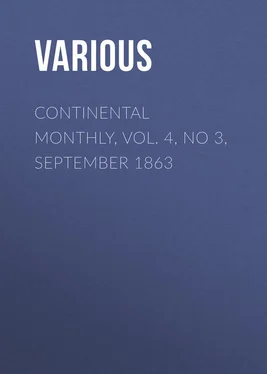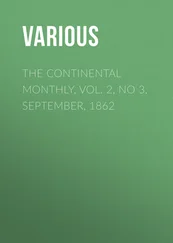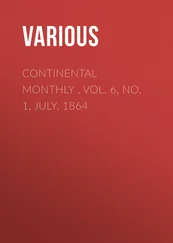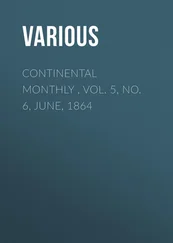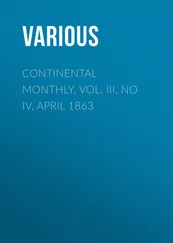Various - Continental Monthly, Vol. 4, No 3, September 1863
Здесь есть возможность читать онлайн «Various - Continental Monthly, Vol. 4, No 3, September 1863» — ознакомительный отрывок электронной книги совершенно бесплатно, а после прочтения отрывка купить полную версию. В некоторых случаях можно слушать аудио, скачать через торрент в формате fb2 и присутствует краткое содержание. Жанр: periodic, Языкознание, periodic, foreign_edu, на английском языке. Описание произведения, (предисловие) а так же отзывы посетителей доступны на портале библиотеки ЛибКат.
- Название:Continental Monthly, Vol. 4, No 3, September 1863
- Автор:
- Жанр:
- Год:неизвестен
- ISBN:нет данных
- Рейтинг книги:3 / 5. Голосов: 1
-
Избранное:Добавить в избранное
- Отзывы:
-
Ваша оценка:
- 60
- 1
- 2
- 3
- 4
- 5
Continental Monthly, Vol. 4, No 3, September 1863: краткое содержание, описание и аннотация
Предлагаем к чтению аннотацию, описание, краткое содержание или предисловие (зависит от того, что написал сам автор книги «Continental Monthly, Vol. 4, No 3, September 1863»). Если вы не нашли необходимую информацию о книге — напишите в комментариях, мы постараемся отыскать её.
Continental Monthly, Vol. 4, No 3, September 1863 — читать онлайн ознакомительный отрывок
Ниже представлен текст книги, разбитый по страницам. Система сохранения места последней прочитанной страницы, позволяет с удобством читать онлайн бесплатно книгу «Continental Monthly, Vol. 4, No 3, September 1863», без необходимости каждый раз заново искать на чём Вы остановились. Поставьте закладку, и сможете в любой момент перейти на страницу, на которой закончили чтение.
Интервал:
Закладка:
All honor to such mothers! – Ed.
Waiting, O Father! a fond mother waiting,
Waiting so anxious, the dark tide's abating!
Waiting all breathless, in agonized anguish,
Living by heart-throbs that spring up – then languish;
Catching each sound that comes back from the battle,
Dark shrieks and groans and the lonely death rattle,
Imaging visions of feverish thirsting —
Hearts in their utterest loneliness bursting!
Thinking of him , late the babe of her bosom,
Fair faced and blue eyed, love's tenderest blossom,
Dashing along 'mid the carnage around him,
Fearless as Mars 'mid the balls that surround him,
Changed, as by magic, from home's tender brother,
Lovingest son, both to father and mother —
Changed to a man, to a stern, noble soldier —
None in the field that is braver or bolder!
Writing: 'I'm proud of the name, dearest mother!
Craven is he who would hold any other
While our loved standard of freedom 's in danger,
May he forever be held as a stranger!'
Such are the words in his last noble letter!
What fifteen years that could write any better?
Now I am waiting to know if he 's wounded —
Waiting – to know how my fears must be bounded:
Closed his eyes may be to sorrow or danger —
Dead he may be in the land of the stranger!
God of the desolate – Rachel's Consoler!
Light of the universe – Nature's Controller!
Pity me, pity me! Send consolation!
Let not my heart feel this deep desolation!
He is so young, and he loves me so truly —
Scourge me not, Father! so deep – so unduly!
Leave him! to lighten my life-load of sorrow!
Leave him to brighten the clouds of my morrow!
Leave him to love me when other loves fail me,
Leave him to strengthen when rude storms assail me!
Leave him – so kind, both as son and as brother;
Leave him, a future of hope to his mother!
God of all battles! speed, speed this decision!
Let us not look, as afar, at a vision!
Send to our soldiers the true men to lead them:
They have the courage – do Thou guide and speed them!
Then shall our sisters, our wives, and our mothers
Feel that our husbands, our sons, and our brothers,
Though they may fall, are not led to the altar
Heedless and reckless, like beasts by the halter!
Then we may feel, though their dear blood is staining
Freedom's fair banner, a COUNTRY we're gaining!
Then we may look, though with eyes dim and burning,
Some day or other, their blessed returning!
Or we may see, though with eyes dim with weeping,
Freedom's bird hover in love o'er their sleeping:
Feeling, though sorrow may make our heads hoary,
They are not victims of weakness, but glory!
EARLY HISTORY OF THE PRINTING AND NEWSPAPER PRESS IN BOSTON AND NEW YORK
To write an article on the history of the Art of Printing, without paying our respects, in the first instance, to the Devil and Doctor Faustus, will be considered not only a violation of all precedent, but, as regards those individuals, a positive breach of good manners. They have so long been associated together, not only in popular tradition but in books, that the greater part of the reading world seem to think them to have been the original partners in the republic of letters. Indeed, for some absurd reason or other, the opinion is even yet quite prevalent that one of the original concern has been a silent partner, though not a sleeping one, in every printing establishment since. The proposition, to this extent, is certainly inadmissible; and yet, from the moral condition of a large portion of the press, it must be confessed there is strong presumptive evidence that in the unhappy influences exercised by the personage referred to over the affairs of men, he is not altogether neglectful of the press. Be this, however, as it may, the press has become, in this country especially, an engine of such great importance in the daily affairs of life – its energies are of such tremendous power, either for good or evil, that it is believed a few moments can be profitably spent in glancing at its rise and early progress in Boston and New York.
The honor of setting up the first printing press in the American Colonies belongs to Massachusetts. Only eighteen years had elapsed from the landing of the Pilgrims at Plymouth, before a press was in operation at Cambridge – then as populous as Boston. The project of establishing a press in the New World was conceived and almost executed by the Rev. Jesse Glover, a dissenting clergyman in England, who had interested himself largely in planting the colony, and a portion of whose family was already in America. Mr. Glover raised the means of purchasing his press, types, and other necessary apparatus by contributions in England and Holland. With these materials he embarked for America in 1638, but died a few days before the ship reached the shore. Cambridge was at that time the seat of the civil and ecclesiastical power in Massachusetts; and as the academy which subsequently grew into Cambridge University had then been commenced, it was determined by the leading men of the colony to establish the press there; and there it remained for sixty years under their control, and forty years before a press was established in any other colony. The first printer was Stephen Day, engaged in London by Mr. Glover, and supposed to be a descendant of the celebrated John Day, the noted printer. The second printer in the Colonies was Samuel Green, to whom Day relinquished the business in 1649. Colonel Samuel Green, the late venerable editor of the New London Gazette , was a descendant in a direct line from the original printer of that name; the family having uninterruptedly engaged in that business for nearly two hundred years. The elder Green printed the Indian Bibles and Testaments for those early apostles of the New World who first engaged in the benevolent work of attempting the civilization and evangelization of the aboriginals of this country – a noble race of wild men, who have melted away before the palefaces, like the hoarfrost beneath the beams of the morning sun.
The sturdy republican religionists of New England became very soon as chary of allowing the freedom of the press as were the Pontiff and the crowned heads of Europe. Some religious tracts having been published which the clergy and the General Court deemed of too liberal a character, licensers of the press were appointed in 1662; but in the year following, it was ordered by the Provincial Government that 'the printing press be as free as formerly.' This freedom, however, was soon exerted more freely than ever. The attention and the fears of the Government were accordingly again awakened; and in October, 1664, it was enacted that no printing press should be allowed in any other town or place of the colony than Cambridge; and that no person or persons should be permitted to print anything even there, but by the allowance of at least two of a board of three censors appointed for that purpose. But even the licensers were not sufficiently rigid to please the General Court – for, having permitted the publication of that most excellent and pious little work, 'The Imitation of Christ,' by Thomas à Kempis, it was held to be heretical by the Legislature, and its further publication without a new revision was prohibited in 1667. The principal specification against it was that it was written by a Popish minister.
In 1671, the General Court directed the revision and publication of the laws of the colony. Until that time the laws had always been printed at the expense of the commonwealth. But a wealthy bookseller, by the name of John Usher, applied for permission to publish them on his own account; and to prevent Green from printing extra copies for himself, he procured the passage of an act prohibiting the printing of any more copies than he should direct; and in this enactment we find the origin of copyright in this country. In 1673, the copyright was secured to Usher for seven years. Green soon became a prolific printer. He came to this country so destitute as to be obliged to sleep under the shelter of a barrel; but lived to an advanced age, and had two wives and nineteen children. He was early in life elected an ensign of the Cambridge militia company, and subsequently rose to the rank of captain, under which commission he served thirty years. So exceeding fond was he of his martial life, that, when extremely old, he was carried to the parade ground in a chair to direct the exercises of his company. Some of his descendants have been engaged in the printing business for more than a century past in Connecticut. Others of his family established their business at Annapolis, in Maryland, in 1740, where it has been continued by their descendants until the present day.
Читать дальшеИнтервал:
Закладка:
Похожие книги на «Continental Monthly, Vol. 4, No 3, September 1863»
Представляем Вашему вниманию похожие книги на «Continental Monthly, Vol. 4, No 3, September 1863» списком для выбора. Мы отобрали схожую по названию и смыслу литературу в надежде предоставить читателям больше вариантов отыскать новые, интересные, ещё непрочитанные произведения.
Обсуждение, отзывы о книге «Continental Monthly, Vol. 4, No 3, September 1863» и просто собственные мнения читателей. Оставьте ваши комментарии, напишите, что Вы думаете о произведении, его смысле или главных героях. Укажите что конкретно понравилось, а что нет, и почему Вы так считаете.
